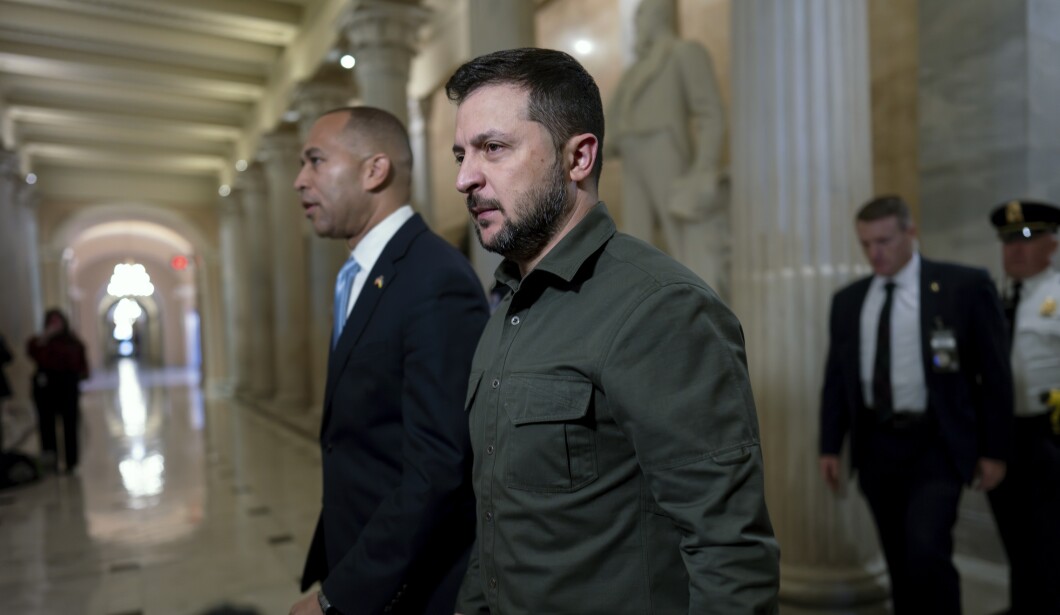
President Joe Biden’s plan to continue military aid for Ukraine has the makings of a political ambush, timed to coincide with the 2024 election season and set at the expense of the Ukrainian war effort, according to congressional Republican sources.
“Cynics would say they’re not really committed to Ukraine and they’re hoping they can extract themselves and blame Republicans for it,” Sen. Marco Rubio (R-FL), a senior member of the intelligence and foreign relations committees, told the Washington Examiner. “I would hope that isn’t the case.”
TRUMP LOOKING FORWARD TO 2024 GENERAL ELECTION, PAST THE PRIMARIES AND MAYBE 2020
The suspicion comes from a combination of funding process and policy frustrations with the administration, felt acutely by Republicans who favor additional aid to Ukraine despite pressure from their right flank. House Speaker Kevin McCarthy (R-CA) now has to navigate the kind of spending fight that drove John Boehner out of Congress, a task complicated by Biden’s request for $24 billion of supplemental funding, which is just enough to aid Ukraine through the end of 2023.
“There is a growing concern among Republicans that the way that the administration is going about trying to get Ukraine support funded is basically a joke: ‘Are you trying to unseat Kevin McCarthy or are you trying to support Ukraine?’” a House Foreign Affairs Republican aide told the Washington Examiner. “Why on earth would you give us a three-month supplemental and not a supplemental that would get us past the election? Because the more votes we have to take on this, the harder it’s going to be.”

The question of how large a funding bill would be required to sustain the Ukrainians through the November elections remains unclear. Congress previously has provided about $113 billion of aid for Ukraine. U.S. officials have offered, according to Rubio, a “ballpark” estimate that $100 billion of additional aid will be necessary over the course of 2024, but that’s a sum total that he thinks could be reduced through prioritization.
“I think that number is too high. There’s things to shave off of it,” he said. “That includes everything — that includes support for Ukrainian government operations, that includes humanitarian stuff. … That includes replenishing our own stockpiles. … That’s holistically. And it’s also based on the assumption that this [war] will continue on the same pace and scale for the next 12 months.”
Senior Republicans have warned the administration that they need to get whatever additional funding they need before the 2024 election cycle makes it impossible.
“We’re not going to [be able to] do this every 90 days. I challenged them to come up with a number that would get Ukraine through the American elections,” Sen. Lindsey Graham (R-SC) told reporters after a classified briefing of the Senate on the war in Ukraine. “They heard it from me and others that you need to give us what it takes Ukraine to stay in the fight, beat Putin through the election cycle, and then it’d be up to us to sell the American people.”
That’s an implausible complaint, from the perspective of Democratic lawmakers conscious that Rep. Marjorie Taylor Greene’s (R-GA) demand that “not another penny will go to Ukraine” has growing support on the right.
“Let me put it this way: you obviously want the request to be conditions-based,” Sen. Chris Van Hollen (D-MD), who sits with Graham and Rubio on the Senate Foreign Relations Committee, told the Washington Examiner. “Either with this amount or [enough to get through] end of the year, you’ve got House Republicans refusing to move it.”
The funding controversy is erupting at a fraught juncture in the war. Ukrainian President Volodymyr Zelensky conducted a diplomatic swing through New York and Washington this week, making an appeal for more aid, especially the long-range missiles, known as ATACMS, that Ukrainian forces need for quick-strike destruction of the mobile air defense systems that Russia has placed through Crimea, which Biden has hesitated to provide.
“I think Biden has backed us into a stalemate,” a House Republican lawmaker told the Washington Examiner. “And he’s gonna find every way he can to try to shift blame but tuck it into this narrative [that] Democrats support democracy and MAGA Republicans don’t.”
White House officials have their own pressures to balance. Biden’s team has signaled their fear that Russia might use nuclear weapons to prevent Ukraine from retaking Crimea and has hesitated to provide the kind of equipment appropriate for such a goal. Ukrainian forces have made slow progress in their counteroffensive using attrition warfare tactics, which gradually have allowed them to increase the regularity and efficacy of their attacks on Russian positions in Crimea.
“I worry that the administration is trying to blame House Republicans for dwindling support for Ukraine, and then they can go to the Ukrainians and say, ‘You know, look, we can’t keep funding this because look at what the House Republicans are doing,’” the Republican aide with the House Foreign Affairs Committee said. “I think they are having many more conversations about how they bring this to a negotiated peace, internally, and are looking for a reason to go to the Ukrainians and really, really start pushing this in a serious way. And [they] want the House Republicans to be the fall boy for it.”
Such an assessment would put Biden and his right-wing opponents in a paradoxical sort of alignment on Ukraine. And some Republicans alarmed by this thought nonetheless acknowledge a negotiated settlement likely will need to occur.
“In a funny way, Biden and the sort of right-wing skeptics of Ukraine are actually not that far apart,” a former Senate aide who remains close to senior Republican politicians said. “The ideal scenario [is one] where Putin is forced to come to a deal that is unattractive to him because the alternative is worse. So they’re both scenarios that involve negotiation and the absence of a clean absolute [Ukrainian] victory at the end, but they’re still very different scenarios.”
CLICK HERE TO READ MORE FROM THE WASHINGTON EXAMINER
Yet Biden’s rhetoric about aid for Ukraine, juxtaposed with House GOP infighting, might position him to get a political win either way, as Rubio put it.
“I’m not saying I’ve signed up for that theory myself and can’t prove it,” Rubio said. “But some cynics argue that [the Biden team is] not really that deeply committed to Ukraine, and if … they get it, great, and if they don’t, they’ll blame Republicans for it.”




